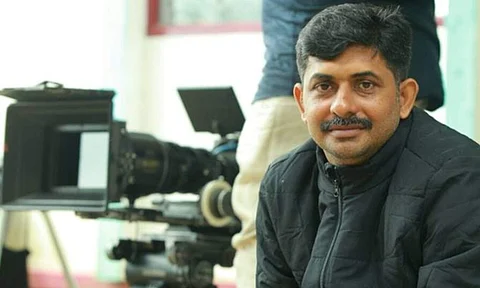

It took a real-life cop to show the unglamorous side of police work in a way we had not seen before in the much-acclaimed Joseph (2018) and Nayattu (2020). Shahi Kabir, the brains behind them, is back with another police story, this time in a directorial capacity, his first. Two friends, Nidhish G and Shaji Maarad, also policemen, penned the screenplay from the former's story. Shahi had worked and trained with them in Ila Veezha Poonchira, the eponymous location, briefly. The work that Shahi refers to is supervising a police wireless repeater station situated 3000 feet above sea level. In Ela Veezha Poonchira, Soubin Shahir, Sudhi Koppa, and Jude Anthany Joseph play police personnel inhabiting a similar station. "This station collects all the signals from that particular district," explains Shahi. "Every district has one. One officer is in charge of handling technical issues, the other protecting that area."
Asked why he chose to set his film here, Shahi says it was an urge to do something minimal. "I was looking for a subject that didn't require a large crowd or set, and in Ela Veezha Poonchira, I found the perfect material. Not that I wouldn't ever think of directing my own script; in this case, however, I liked the script a lot and felt that I should direct it."
Ila Veezha Poonchira, the place, has a speciality. It's one of those areas that can be beautiful and pleasant at times and mysterious and dangerous at others. "It has an ever-changing nature," says Shahi. "There would be instances where you feel so happy, and a sudden lightning strike would dampen your spirits."
Shahi is tight-lipped about the film's subject, and rightfully so. However, he has a few words of praise for Soubin's performance. "He did his part brilliantly and with much sincerity, too, which should be quite evident from the teasers and trailers. All of the characters in this story are ordinary. Soubin plays an ordinary cop. It's a relatively serious character -- unlike anything he has done before."
Ela Veezha Poonchira sees Shahi working again with Joseph cinematographer Manesh Madhavan, who has been with the team since the story conception, even before a producer came on board. "I was particular about having all the technicians on board while we were narrating it," says Shahi. Aside from Manesh, Shahi took editor Kiran Das and sound designer Ajayan to the location frequently to study the area thoroughly. "The location and sound were of paramount importance. We shot it in sync sound (P Saanu) and captured ambient sounds as much as possible. The location was not practical for shooting because, as far as a cinematographer is concerned, light variations caused by climate changes were a challenge. Making things more complicated was a cyclone. We hardly got proper light. It was a risky task for Manesh. We turned to VFX to maintain climate continuity in areas we normally couldn't."
Interestingly, Shahi and Manesh opted to capture the visuals in high dynamic range for a particular reason. "You see, we have cameras like ARRI and RED with which we can shoot in high dynamic range (HDR). But most people usually don't do it because, even if HDR were employed, not every theatre has compatible ATMOS or Dolby Vision technology. We shot in HDR because we can grade it in the same. We didn't want to compromise on quality. Today, many television sets come equipped with HDR. A couple of OTT platforms support it too. In the theatre, however, the film will be screened normally whereas, on digital devices, there will be an option to switch to the relatively more vivid HDR version."
Shahi, who had served as Dileesh Pothan's assistant on Thondimuthalum Driksakshiyum, in addition to playing a police driver in the same, asserts that he has chosen to follow his individualistic style instead of that of the directors with whom he worked. "You see, we can understand a director's filmmaking by watching his films. We don't necessarily have to be with Dileesh Pothan or Martin Prakkat to do that; we can watch their films. And I don't think filmmaking is something we can learn from one person alone. If I take a particular scene, I would think of the best way to execute it. When another director handles the same scene, they'll have a different way of envisioning it, with a perfectly reasonable explanation for why they are doing it that way. That's another lesson we get while working with other filmmakers. It's all about perspectives. We get to understand the pluses of their vision as well as ours."
Shahi isn't against the idea of assisting a filmmaker, though, as he feels this is necessary for gaining practical knowledge. "We get to understand how a set works and how to deal with all kinds of people and their varied personalities. As for visually realising a particular story, one should have a clear vision of the entire script. I believe that even a realistic script needs a fairly cinematic treatment to succeed on the big screen," he adds.
Vishnu Venu, who produced Kappela, backs Ela Veezha Poonchira under his banner, Kadhaas Untold. The film hits theatres this Friday.